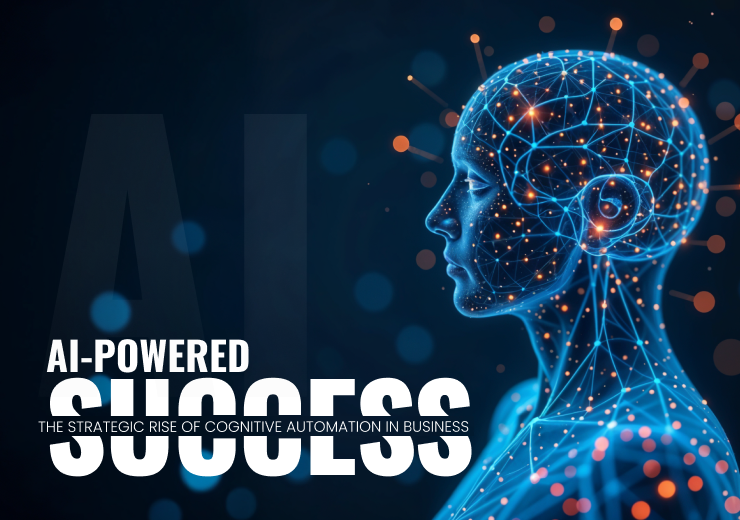- Admin
- June 4th, 2025
- 4 min Read
AI-Powered Success – The Strategic Rise of Cognitive Automation in Business
Artificial Intelligence (AI) and cognitive automation are not just trends—they are transformative forces redefining how modern businesses operate, compete, and grow. From smarter decision-making to seamless operations, AI is driving a new era of innovation.
By simulating key human cognitive functions such as learning, reasoning, and problem-solving, AI-powered systems can process and interpret massive volumes of data at speeds no human could match. This evolution is touching every sector—from retail and healthcare to finance and customer service—making operations faster, smarter, and more sustainable.
Cognitive Automation: Bridging AI with Intelligent Automation
Cognitive automation blends the predictive power of artificial intelligence with the efficiency of robotic process automation (RPA), enabling businesses to handle both rule-based and complex, judgment-intensive tasks.
Unlike traditional automation, which relies strictly on predefined rules, cognitive automation learns continuously from data patterns and adapts to new trends. For example:
- Customer Service: AI chatbots handle routine queries instantly while escalating nuanced cases to human agents, improving both customer satisfaction and cost efficiency.
- Finance: AI algorithms monitor market trends, detect fraud, and refine investment strategies with unmatched accuracy.
Key Use Cases of AI in Modern Business
AI’s impact extends far beyond efficiency—it’s a catalyst for personalized experiences, innovation, and business agility. Here’s how industries are leveraging it:
- Retail: Personalized product recommendations powered by machine learning increase conversions and enhance the customer journey.
- Manufacturing: Predictive maintenance driven by AI minimizes downtime and lowers operational costs.
- Healthcare: AI revolutionizes diagnostics, drug development, and treatment plans, improving patient outcomes significantly.
- Marketing: Behavioral analytics enable hyper-targeted campaigns, driving higher engagement and ROI.
The Strategic Edge: Why AI is a Business Imperative
In today’s competitive environment, being future-ready means being AI-ready. AI is no longer just an advanced tool—it’s a core component of business strategy. Companies using AI to uncover insights, detect anomalies, and forecast outcomes can make smarter, faster decisions.
- According to McKinsey, AI could inject up to $13 trillion into the global economy by 2030.
- A PwC report reveals that businesses using AI for decision-making see efficiency gains of up to 25%.
Organizations embracing AI today are better positioned to navigate shifting market demands and stay ahead of disruption.
Navigating Challenges: What Businesses Should Consider
Despite its transformative potential, AI adoption is not without challenges. Here are some key concerns:
- High Setup Costs: Implementing AI requires investment in infrastructure, data systems, and skilled talent.
- Data Privacy & Security: Ensuring compliance with evolving data regulations is critical.
- Ethical Concerns: AI must be designed to avoid bias and ensure fair outcomes—responsible AI frameworks are essential.
- Workforce Impact: While automation may displace certain roles, it also creates opportunities in AI development, oversight, and strategic planning.



